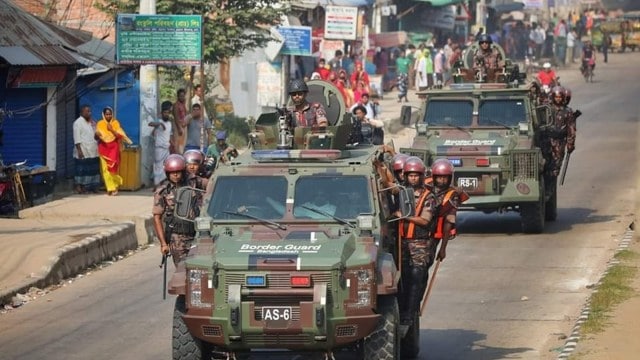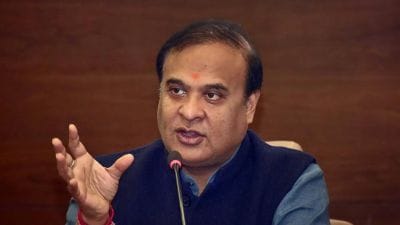Bangladesh news update: Russia, US spar over election interference as BNP renews calls for strike
The call for strikes comes amidst allegations of foreign interference in Bangladesh's political landscape, with Russia claiming that the United States is stirring up unrest as the country is set to go to polls on January 7, 2024.
 Security forces seen at Bangladesh's Gazipur Naozor amid protests in November 2023. (Facebook/Bangladesh Nationalist Party-BNP)
Security forces seen at Bangladesh's Gazipur Naozor amid protests in November 2023. (Facebook/Bangladesh Nationalist Party-BNP) Ahead of the 2024 general elections, Bangladesh is witnessing a series of protests and controversies — both internally and externally — with one of the major political parties in the country calling for a nationwide boycott of the polls.
The Bangladesh Nationalist Party (BNP) has been conducting a series of strikes over the past few months and has called for a national blockade and harthal on November 28 and 29. The party’s primary demand is that the ruling Awami League government, headed by party president and Prime Minister Sheikh Hasina, step down from power prior to the election. BNP and its allies also want the upcoming election to be held under a non-partisan administration to prevent alleged rigging.
The call for strikes comes amidst allegations of foreign interference in Bangladesh’s political landscape, with Russia claiming that the United States is stirring up unrest as the country is set to go to polls on January 7, 2024.
Russia’s allegations against Washington
Last week, the spotlight was on Russia, which alleged that the United States is attempting to interfere in Bangladesh politics to ensure support for its “Indo-Pacific strategy.”
“We have spoken repeatedly about the attempts by the United States and its allies to influence internal political processes in Bangladesh, ostensibly under the banner of ensuring ‘transparency and inclusiveness’ in the upcoming parliamentary elections there,” Russian Foreign Ministry spokesperson Maria Zakharova said during a routine briefing last Wednesday.
“Information has come to light regarding a meeting at the end of October between US Ambassador to Bangladesh Peter Haas and a high-ranking representative of the local opposition. They reportedly discussed plans to organise mass anti-government protests in the country during the meeting. In particular, the American Ambassador promised his interlocutor to provide information support in the event that the authorities used force against participants in ‘peaceful demonstrations.’ These assurances were purportedly made on behalf of the embassies of the United States, Britain, Australia and several other countries,” Zakharova claimed.
US responds
Responding to the Russian allegations, the US reiterated that it does not support or favour any political party in Bangladesh.
“We are aware of Zakharova’s deliberate mischaracterisation of US foreign policy and Ambassador Haas’s meetings,” a US State Department spokesperson in Washington said, as per the news agency PTI.
“To support that shared goal of free and fair elections conducted in a peaceful manner, US Embassy personnel engage and will continue to engage with the government, opposition, civil society, and other stakeholders to urge them to work together for the benefit of the Bangladeshi people,” the official said, adding, “The United States does not support any political party in Bangladesh. Nor does the United States favour one political party over another.
The heated exchange between the two nations is the latest in a series of arguments on the issue. Earlier in September, Russian Foreign Minister Sergei Lavrov, during a visit to Bangladesh, had said: “We can clearly see that the US and its allies are truly trying to promote their interests in the region by using the so-called Indo-Pacific strategy,” adding, “Their (US) goal is clearly both to counter China and to isolate Russia in this region.”
In the next part of this series, we take a look at the circumstances of PM Hasina’s rise to power and how her policies have shaped the country.
- 01
- 02
- 03
- 04
- 05































